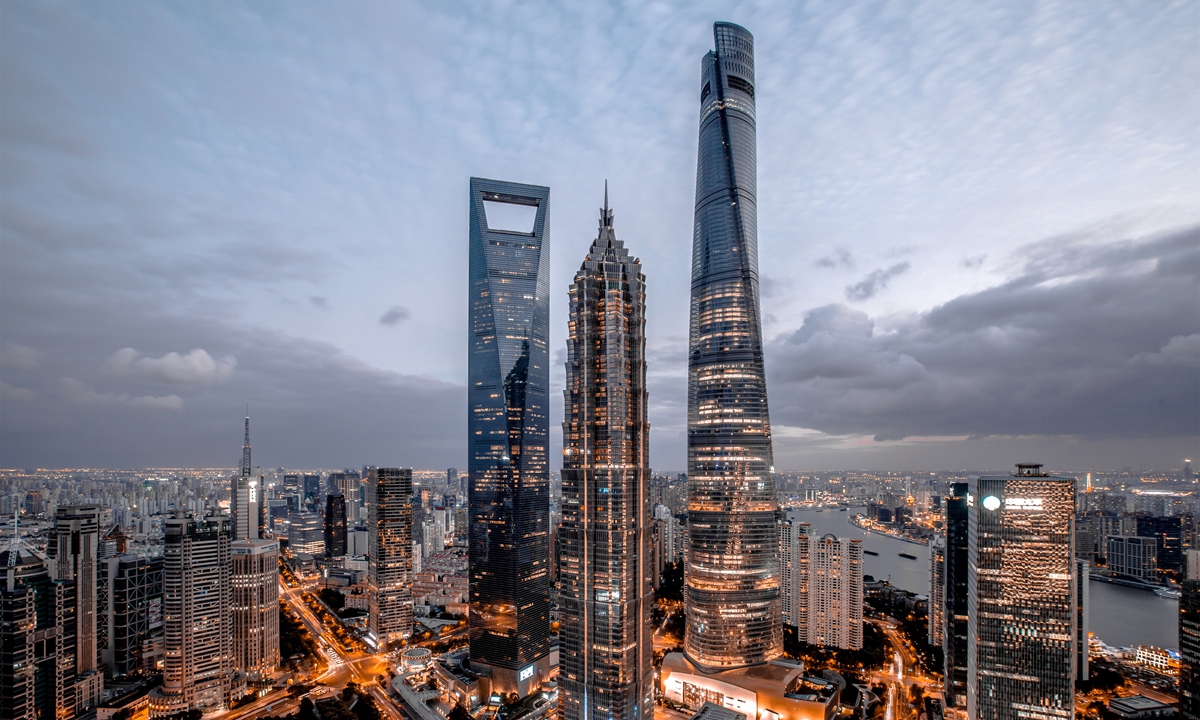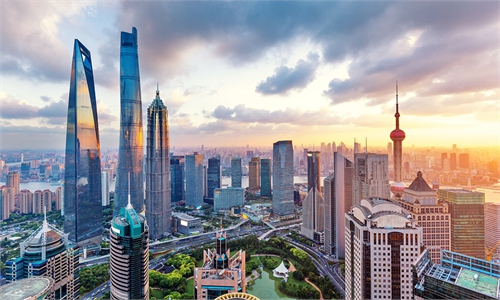Global investors pouring into Chinese capital markets, highlighting country’s role as ‘safe haven,’ engine of world growth: analysts

Lujiazui, a financial zone in Shanghai Photo: VCG
Global investors have been pouring capital into Chinese stocks and bond markets, a trend that drove emerging market portfolio flows for a third straight month in March, fresh data released by the Institute of International Finance (IIF) showed. Analysts said this underscored the global market's built-up confidence in the prospects of the world's second-largest economy, which has been on a faster-than-expected recovery trajectory.
The inflow of foreign capital, coupled with the increasing number of CEOs from leading global companies who recently travelled to China with stepped-up investment plans, also highlighted China's ascending role as a "safe haven" for global investors and a major engine of world growth, in particular against the backdrop of rampant inflation as well as volatile markets in the US and Europe, which have been exacerbated by the bank crisis, observers said.
Capital flows into Chinese stocks more than doubled from February to $7.2 billion, bringing total investment in Chinese shares this year to $30 billion, according to IIF. Capital inflows into Chinese debt also jumped to $3 billion in March, from $800 million in February.
In March overall, global investors put $9.4 billion into emerging markets, including $6.8 billion into stocks and $2.6 billion into bonds. Emerging markets outside China saw capital outflows of $500 million from equities and $400 million from bonds.
Global investment flow patterns often serve as a proxy for confidence in an individual economy. Therefore, the large number of investors ploughing into Chinese capital markets - a trend that has been picking up since the end of last year - which also coincided with an exodus from US-focused stock funds, carries great significance, analysts said.
"The collapse of Silicon Valley Bank has exposed profound risks in the Western financial system. It is natural that global investors were spooked and looked for other options to cushion against the risks. As such, China is arguably an ideal destination," Tian Yun, an independent macro analyst, told the Global Times on Friday.
Tian explained that the relative stability of China's financial market, as well as the yuan's exchange rate against the dollar during the Fed's interest rate hike cycle, has provided a basis of sufficient assurance for global investors.
"It is also worth noting that financing costs in the Chinese market have also been inching lower than that of some advanced economies such as the US, Europe and Japan, a rare event resulting from policy differences during the past years, where the Chinese central bank has maintained consistency while Western countries adopted a distorted, flip-flopping monetary policy," Tian said, noting that this will give China an overwhelming advantage in attracting global capital.
Observers also stressed that the capital inflow could be regarded as a "vote with the feet" on confidence in the Chinese economy, which is at the early stage of a quick reboot, whereas the US and other Western economies are on the brink of a looming recession.
Managing Director of the International Monetary Fund (IMF) Kristalina Georgieva said on Thursday that China and India are projected to account for half of global growth in 2023, and the world economy is expected to grow less than 3 percent this year, with economic activity in the US and the Euro Area slowing.
Georgieva said earlier that China is set to account for around one-third of global growth in 2023.
China has held two major forums - the China Development Forum and the Boao Forum for Asia - in recent months, drawing a flock of executives from many multinational companies to visit China, one of their fast-growing markets. The country will also hold the 3rd China International Consumer Products Expo, also known as the Hainan Expo, next week, sharing the dividends of its vast market with global companies.
On Thursday, Airbus also announced the opening of a second assembly line in North China's Tianjin Municipal. The deal was made during French President Emmanuel Macron's state visit to China.
According to a survey PricewaterhouseCoopers sent to the Global Times on Friday, the majority of multinational companies are committed to investing in the Chinese market, with over 70 percent of respondents saying they are not considering moving production out, which shows strong confidence in China's development.
A number of factors were listed as important draws by the surveyed enterprises, including the sheer size of the local market, a complete industrial chain and basic infrastructure.
In the first two months, foreign direct investment in the Chinese mainland rose 6.1 percent year-on-year to 268.44 billion yuan ($39.1 billion), according to data from China's Ministry of Commerce.

